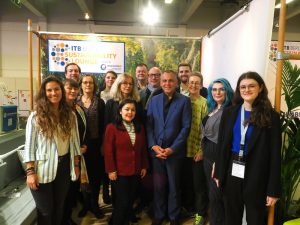From May 9 to May 13, Matthias had the opportunity to attend the Global Sustainable Tourism Conference in Antalya and moderate a panel on sustainable tourism in the Balkan region. I would like to thank Dunja Djenic, Madlina Puka and Ante Mandić for their inspiring contributions in the panel and Randy Durband and Roi Ariel for a really successful conference!
My take aways from Antalya:
1. We need to speed up
Measured against the urgency, we are still too slow on issues related to the implementation of sustainable tourism. This is partly because sustainability is increasingly perceived as important, but still not sufficiently urgent by many to treat the issue as a priority. The reference to an increasing but still insufficient demand must not serve as an alibi, as it is in our very own interest to protect the basis of our business – namely intact natural, cultural and human resources. Otherwise, we ourselves will be sawing off the branch on which we are sitting.
2. We need to penetrate the market more
For at least 30 years we have been dealing with the question of how to make tourism more sustainable. Nevertheless, the number of sustainable and, where applicable, certified destinations and businesses worldwide is still very small. The goal must be to transform the industry along the entire value chain in such a way that the possibility of using non-sustainable offers is reduced to a minimum. Sustainability must become a natural characteristic of tourism offers. In order to achieve this, not only a stronger commitment of the tourism industry and an increased demand of the consumers are needed, but also corresponding political framework requirements. Otherwise, the necessary timely restructuring of the tourism industry does not seem realistic.
Turkey, for example, has made it mandatory to meet sustainability standards by 2030. In addition to mandatory measures, policymakers have many instruments at their disposal to promote the market penetration of sustainability. They should use them more strongly and courageously and make the fulfilment of SDGs and the GSTC-criteria in tourism more bindig.
3. We must adapt
On the one hand, as much as it is to be welcomed that the industry is striving for climate neutrality, on the other hand we should not be misled into believing that this alone is enough to make the industry fit for the future. Rather, we also need to take a hard look at climate adaptation, as climate change alone will significantly alter tourism over the next 15 years.
On the one hand, as much as it is to be welcomed that the industry is striving for climate neutrality, on the other hand we should not be misled into believing that this alone is enough to make the industry fit for the future. Rather, we also need to take a hard look at climate adaptation, as climate change alone will significantly alter tourism over the next 15 years.
We have to be honest with ourselves here and proactively initiate necessary changes and adjustments towards a resilient tourism development now. Otherwise we expose ourselves to risks that we will sooner or later no longer be able to control ourselves.



